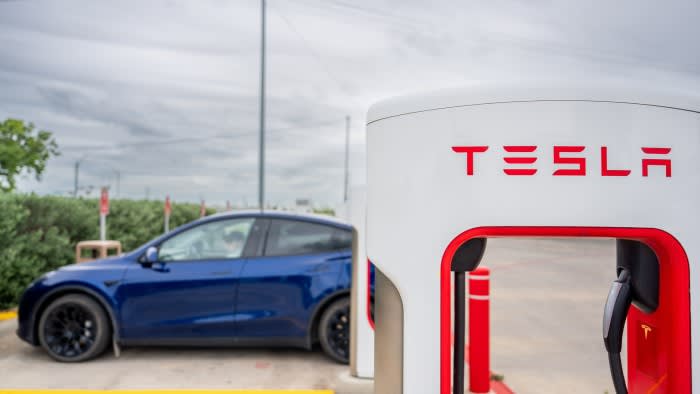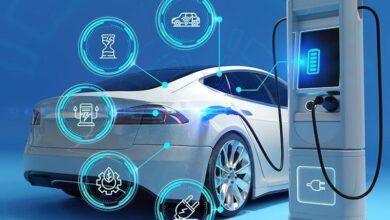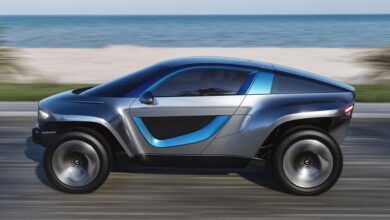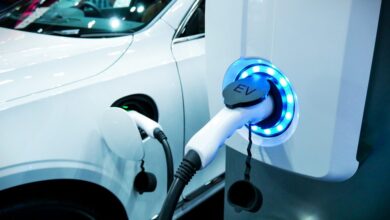Tesla shares rise on plans to accelerate launch of ‘more affordable’ models

Unlock the Editor’s Digest for free
Roula Khalaf, Editor of the FT, selects her favourite stories in this weekly newsletter.
Tesla has pledged to bring forward the launch of “more affordable” models of its electric vehicles, helping its stock recover some of its recent losses despite reporting a 9 per cent decline in first-quarter revenue amid a sharp fall in sales.
In a filing on Tuesday, the electric-car maker said it had “updated our future vehicle line-up to accelerate the launch of new models ahead of our previously communicated start of production in the second half of 2025”.
It added that these would include “more affordable” vehicles that could be produced on its existing manufacturing lines. Tesla shares rose more than 12 per cent in after-hours trading.
Chief executive Elon Musk said in January that Tesla was preparing to start production of a new lower-cost car next year, priced at $25,000 and dubbed Model 2. The stock had fallen on a Reuters report earlier this month that the project had been shelved, which Musk denied.
On a conference call, Musk refused to be drawn on specific plans for an affordable “next generation vehicle” or how it would be produced using Tesla’s current infrastructure. He had previously said the Model 2 would require a new “revolutionary manufacturing system” at factories in Austin, Texas, as well as in Mexico.
Instead, Musk said more information would be given alongside an August announcement about “robotaxis” and sketched an ambitious vision for Tesla as an “AI and robotics company” based around its autonomous driving system and humanoid robots.
“If you value Tesla just as an auto company you fundamentally have the wrong framework. If you ask the wrong question, the right answer is impossible,” he said. “If somebody doesn’t believe Tesla is going to solve autonomy they should not be an investor in the company. And we will and we are.”
The results come at turbulent time for Musk and the EV sector. Before Tuesday’s after-hours share price rise, Tesla stock had plunged more than 40 per cent since the start of the year after warning of slowing vehicle deliveries, eroding profit margins, a potential move of its incorporation to Texas from Delaware and revealing plans to cut more than 10 per cent of its workforce — at least 14,000 jobs.
Most big US carmakers have reported a drop in EV sales due to softening consumer demand, a shift in preference to hybrids and increased competition from low-cost options from Chinese brands.
“While Tesla has real issues to contend with, we believe the company’s long-term upward trajectory remains intact,” said Christopher Tsai of Tsai Capital, which holds Tesla stock. “The potential for high-margin autonomy revenue should not go unheeded.”
Absent the enthusiasm about a new vehicle line-up, the underlying financial performance remained disappointing. First-quarter revenue fell to $21.3bn from $23.3bn in the same period last year, missing analysts’ expectations for $22.3bn. That marks Tesla’s first year-on-year quarterly drop since the start of 2020.
Adjusted earnings per share almost halved from a year ago to 45 cents, versus estimates for 52 cents, and the carmaker reported a sixth consecutive quarter of declining gross margins. The closely watched financial metric fell to 17.4 per cent, down from a peak of 29.1 per cent in the first quarter of 2022.
“We experienced numerous challenges, from the Red Sea conflict and the arson attack at Gigafactory Berlin, to the gradual [increase in production] of the updated Model 3 in Fremont,” Tesla said of the start to the year. “Global EV sales continue to be under pressure as many carmakers prioritise hybrid over EVs. ”
Earlier this month, Tesla said it had delivered 386,810 electric cars between January and March, a fifth lower than the previous quarter, and 8 per cent below the same period in 2023. It has continued to cut prices for its most popular models as unsold-vehicle inventory piles up: that measure rose to 28 days of supply from 15 days a year ago.
Tesla still makes more than 80 per cent of its revenue from selling cars. Excluding the effects of regulatory credits, the gross margin from its automotive unit — a closely watched measure of its core operations — fell to 16.4 per cent for the quarter, down from 19 per cent a year ago.
Musk’s commitment to AI was evident in a big jump in “AI infrastructure capex” to $1bn, resulting in cash flow of negative $2.5bn in the period.
He said that Tesla had installed 35,000 H100 Nvidia AI model training graphics processing units and that this number would rise to 85,000 by year end. He added that its humanoid robot, dubbed Optimus, would be “more valuable than everything else combined”.
Musk is also seeking to change the company’s state of incorporation to Texas, partly in protest at a Delaware court decision to void a $56bn pay package he was awarded in 2018. Shareholders will vote on the move and whether to reaffirm his share award at its annual meeting in June.
Additional reporting by Richard Waters



